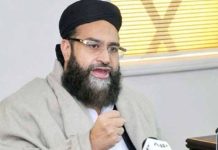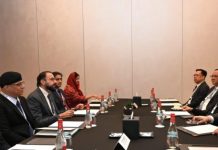ISLAMABAD, AUG 28 (DNA):The Centre for Aerospace & Security Studies (CASS), Islamabad, convened a Roundtable Conference on ‘Weaponising Information: Media Strategies in Modern Warfare’ on 27th August 2025. The discussion highlighted the rising significance of information as a weapon in contemporary conflicts, especially in the wake of the May 2025 India–Pakistan escalation. The event was attended by members of academia and intellectuals. CASS is an independent think tank that continues to arrange academic events for academia and practitioners interested in National Security in its wider context.
The moderator of the conference, Air Marshal Zahid Mehmood (Retd), Senior Director at CASS Islamabad, set the tone by underscoring the centrality of media in modern warfare and its decisive impact on public perception and battlefield outcomes. Stressing the need for moving beyond reactive responses, he emphasised the importance of proactive media strategies to strengthen Pakistan’s resilience against future crises.Mr Amer Zafar Durrani, Founding President of Reenergia and keynote speaker, highlighted the weaponisation of information as a decisive factor in modern conflict, operating across content, distribution, and cognition.
He called for a Joint Information Operations Coordination Cell under the National Security Council, supported by AIpowered detection systems tailored to local contexts. Stressing the importance of verification, provenance tagging, and pre-bunking, he urged policies that counter foreign influence operations while safeguarding civil liberties. He concluded by emphasising digital literacy, regional alliances, and stress-tested protocols as the foundations of Pakistan’s resilience in the information domain.
The second keynote speaker, Mr Rehman Azhar, journalist and anchor at Express News,traced the role of media in the recent Indo-Pak May 2025 conflict, highlighting the Indian media’s reliance on sensationalism under the patronage of the far-right BJP government. He observed that Indian media, unlike its Pakistani counterpart, is not war-savvy and thus resorted to exaggerated false claims of victory in the recent conflict.
Pointing to the rapid evolution of tools such as bots and deepfakes, he stressed that information warfare is highly dynamic and demands a proactive approach. He concluded by stressing the importance of the media taking an active role in the pre-bunking stage, rather than playingonly a reactive role once crises unfold.In his concluding remarks, Air Marshal Javaid Ahmed (Retd), President CASS, thanked the speakers for their practical and academic insights.
He stressed that while India had invested heavily in media preparations to project a narrative of dominance in the May 2025 conflict, it was Pakistan’s tactical performance in the one-hour aerial combat and the professional press briefings by the Pakistan Armed Forces that decisively shifted the information battle. He emphasised that this experience underlines the need for Pakistan to institutionalise media preparedness as a core element of national security strategy.

















